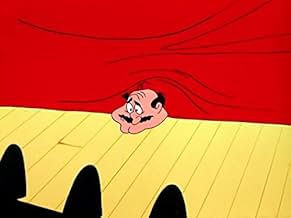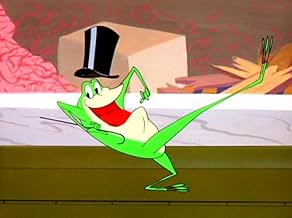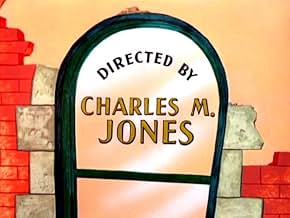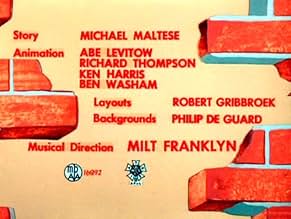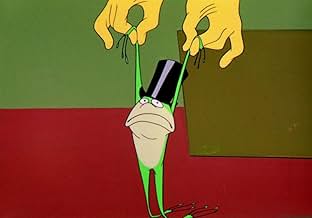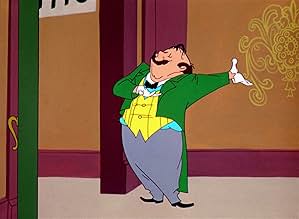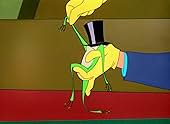NOTE IMDb
8,4/10
6,4 k
MA NOTE
Ajouter une intrigue dans votre langueA man futilely struggles to make his fortune with a frog that sings and dances, but only when it is alone with the owner.A man futilely struggles to make his fortune with a frog that sings and dances, but only when it is alone with the owner.A man futilely struggles to make his fortune with a frog that sings and dances, but only when it is alone with the owner.
- Réalisation
- Scénario
- Casting principal
- Récompenses
- 1 victoire au total
William Roberts
- Michigan J. Frog
- (voix (chant))
- (non crédité)
Avis à la une
What is there to say about Chuck Jones's 'One Froggy Evening' that hasn't been said already, not just one of the greatest cartoons ever made but one of the best things to ever happen anywhere ever! The story of a demolition worker who discovers a singing frog in the cornerstone of a building and attempts to exploit the creatures talents for profit, 'One Froggy Evening' is often called "the 'Citizen Kane' of animated shorts". That level of artistic worth is not an exaggeration. Everything, absolutely everything, is perfect about 'One Froggy Evening'. For one, the timing is astonishing. Jones tells the story (from a uniquely brilliant script by Michael Maltese, the author of many of the greatest cartoon scripts of all time) completely silent apart from the singing of the frog, who bursts into song at precisely the most hilarious moments possible.
Aside from being side-splittingly funny, 'One Froggy Evening' also works on a deeper level as a profound parable about greed. Presented with this wondrous of a singing frog, the demolition worker's immediate and only impulse is to use it to make money. To his ever-growing frustration, the frog will only sing in his presence. Despite his obsession with money, the demolition worker is extremely sympathetic and the audience shares in his pain even as they howl with laughter at his misfortune. The cartoon ends with another poor sap about to make the same mistakes, showing that no matter how much we progress as a society, greed is a constant in human beings. One element that is not often mentioned is the haunting quality of 'One Froggy Evening'. There's a sense of the supernatural in both a singing frog and a frog that can last for years sealed inside the cornerstone of a building, which always leads me to think of the frog in slightly more sinister terms, as a karmic lesson enforcer! The final image of 'One Froggy Evening' coupled with the distant echo of the frog's song always sends a shiver down my spine.
Aside from all this, there's the wonderful animation and the glorious soundtrack. From the moment the frog leaps out of the box, his back foot slipping a couple of times, he is one of the great animated creations. His ability to snap from spellbindingly charismatic showman to the most uninspiring and ordinary croaker you've ever seen is both hilarious and impeccably achieved. The demolition worker, meanwhile, goes through a wonderful range of Chuck Jones's trademark expressions. The music is great throughout, with a virtuoso performance from singer Bill Roberts who sings a range of classic Tin Pan Alley songs, a snatch of opera and, best of all, a cracking original composition by Chuck Jones and Michael Maltese themselves. Called 'The Michigan Rag', the song is not only the best and catchiest in the whole cartoon, it also provided a name for the frog character when, overwhelmed by the popularity of the film and inundated with requests for the character's name, Jones dubbed him Michigan J. Frog. Despite this popularity, Jones wisely refused to use Michigan in any other cartoons, ensuring 'One Froggy Evening' remains a true one-off and one of the greatest strokes of genius animation has ever seen.
In the interests of keeping it brief, I'll leave it there but I could gush about 'One Froggy Evening' for pages and pages. It really is a landmark piece of film history and more than justifies its appearance on every single list of greatest animated cartoons that's worth a damn.
Aside from being side-splittingly funny, 'One Froggy Evening' also works on a deeper level as a profound parable about greed. Presented with this wondrous of a singing frog, the demolition worker's immediate and only impulse is to use it to make money. To his ever-growing frustration, the frog will only sing in his presence. Despite his obsession with money, the demolition worker is extremely sympathetic and the audience shares in his pain even as they howl with laughter at his misfortune. The cartoon ends with another poor sap about to make the same mistakes, showing that no matter how much we progress as a society, greed is a constant in human beings. One element that is not often mentioned is the haunting quality of 'One Froggy Evening'. There's a sense of the supernatural in both a singing frog and a frog that can last for years sealed inside the cornerstone of a building, which always leads me to think of the frog in slightly more sinister terms, as a karmic lesson enforcer! The final image of 'One Froggy Evening' coupled with the distant echo of the frog's song always sends a shiver down my spine.
Aside from all this, there's the wonderful animation and the glorious soundtrack. From the moment the frog leaps out of the box, his back foot slipping a couple of times, he is one of the great animated creations. His ability to snap from spellbindingly charismatic showman to the most uninspiring and ordinary croaker you've ever seen is both hilarious and impeccably achieved. The demolition worker, meanwhile, goes through a wonderful range of Chuck Jones's trademark expressions. The music is great throughout, with a virtuoso performance from singer Bill Roberts who sings a range of classic Tin Pan Alley songs, a snatch of opera and, best of all, a cracking original composition by Chuck Jones and Michael Maltese themselves. Called 'The Michigan Rag', the song is not only the best and catchiest in the whole cartoon, it also provided a name for the frog character when, overwhelmed by the popularity of the film and inundated with requests for the character's name, Jones dubbed him Michigan J. Frog. Despite this popularity, Jones wisely refused to use Michigan in any other cartoons, ensuring 'One Froggy Evening' remains a true one-off and one of the greatest strokes of genius animation has ever seen.
In the interests of keeping it brief, I'll leave it there but I could gush about 'One Froggy Evening' for pages and pages. It really is a landmark piece of film history and more than justifies its appearance on every single list of greatest animated cartoons that's worth a damn.
10llltdesq
Although some consider What's Opera, Doc? the perfect Chuck Jones cartoon, I would argue that this is the best choice to represent Chuck Jones boiled down to one short. Jones did a great variety of work, but he was at his best with little or no dialog, a visual cartoon that wasn't just slapstick visuals. Put a character into a situation where they either see something they want and grab it (or try to), throw in the law of unintended consequences, stir in a little bad luck and stand back to catch the fireworks! A one-shot cartoon that made its lead character a star. Think about the impact a short like that as to have had over nearly 50 years to accomplish a feat like that! To top it off, it's a morality play in 7 minutes. The more things change, the more they stay the same! Great short, an essential work in the sub-genre of the animated short. Most highly recommended!!!!
I really enjoyed this cartoon. Interesting that Michigan J. would only sing in front of the man who found him and no one else. His songs were great too, especially "McClosky Fight" and "Michigan Rag." Overall, I really like that character. It is a shame that he wasn't in more cartoons, but it's fortunate that the WB kept him around as the network's mascot:
"Watch the frog."
"Watch the frog."
10Zailig
The last two times I saw One Froggy Evening it was in a censored version. In the original, the guy rents a theatre to show the singing frog and peppers the building with posters but no-one comes. He puts out a "free admission" sign but still no-one comes. He then puts out a "free beer" sign and is trampled by the crowd that rushes in. In the censored version, the "free beer" sign is cut. This is not only a stupid thing to do in itself; it also makes no sense since there is no reason why crowds would rush in so enthusiastically to see the singing frog if the only attraction was free admission. The whole point is that no-one believes in the singing frog. Who has committed this stupid act of vandalism and why -- and can we do anything about it?
Chuck Jones and company created another masterpiece with "One Froggy Evening", about a man finding a singing frog who only sings for him, leading to many unpleasant situations. These cartoons were so simple, yet so clever. I think that there's absolutely no doubt that this and many other cartoons from that era will stay firmly ingrained as part of our national heritage forever.
One thing I notice is that Mel Blanc didn't do Michigan J. Frog's voice. But that's no problem. This cartoon is still great. How they came up with these things is beyond me; it just shows that they were geniuses. A great cartoon. These are the sorts of cartoons that we need to show our children.
One thing I notice is that Mel Blanc didn't do Michigan J. Frog's voice. But that's no problem. This cartoon is still great. How they came up with these things is beyond me; it just shows that they were geniuses. A great cartoon. These are the sorts of cartoons that we need to show our children.
Le saviez-vous
- AnecdotesSteven Spielberg once described this as "the most perfect cartoon ever made," as well as "the Citizen Kane (1941) of the animated short."
- GaffesWhen the construction worker is imitating the frog in the talent agency, he's initially holding his hat, then throws his hands up in the air. When his hands come back down, his hat has disappeared. When he is thrown out of the agent's office to the hallway, his hat is back on his head.
- Citations
Michigan J. Frog: [singing] Hello, my baby / hello, my honey / hello, my ragtime gal. / Send me a kiss by wire / baby, my hearts on fire / if you refuse me / honey, you'll lose me / then you'll be left alone / Oh baby, telephone and tell me I'm your own.
- Versions alternativesIn some TV airings, the scene in which the workman places the "Free Beer!" sign outside the theater to attract customers is deleted.
- ConnexionsFeatured in Le sexe qui chante (1977)
Meilleurs choix
Connectez-vous pour évaluer et suivre la liste de favoris afin de recevoir des recommandations personnalisées
Détails
Box-office
- Montant brut aux États-Unis et au Canada
- 14 753 $US
- Week-end de sortie aux États-Unis et au Canada
- 12 285 $US
- 16 févr. 1998
- Montant brut mondial
- 14 753 $US
- Durée
- 7min
- Mixage
- Rapport de forme
- 1.37 : 1
Contribuer à cette page
Suggérer une modification ou ajouter du contenu manquant

